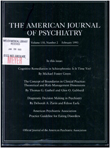The clinical meaning of refractory depression: a review for the clinician
Abstract
OBJECTIVE: The authors' goal is to address the complex issue of treatment-refractory depression from a clinical perspective. DATA COLLECTION: They review the literature on the major clinical and methodological issues involved in the treatment and study of treatment- refractory depression as well as primary and tertiary care surveys of patients whose depression has not responded to treatment. FINDINGS: There are methodological problems in defining treatment-refractory depression and in the tertiary care surveys of treatment-refractory depression. The authors define treatment-refractory depression as primarily involving diagnostic-treatment variables rather than patient variables. They articulate these variable as a series of questions the clinician may consider when confronted with patients who are considered refractory: 1) Is the diagnosis correct? 2) Has the patient received adequate treatment? 3) Was a rational stepped-care approach used? 4) How was outcome measured? 5) Is there a coexisting medical or psychiatric disorder that interferes with response to treatment? and 6) Are there factors in the clinical setting that are interfering with treatment? CONCLUSIONS: The problem of treatment-refractory depression has to do primarily with the diagnostic-treatment process than with patient variables. This has a number of implications in the areas of training, education, research, and public health. The evidence indicates that improvements in the recognition and treatment of depression are needed.
Access content
To read the fulltext, please use one of the options below to sign in or purchase access.- Personal login
- Institutional Login
- Sign in via OpenAthens
- Register for access
-
Please login/register if you wish to pair your device and check access availability.
Not a subscriber?
PsychiatryOnline subscription options offer access to the DSM-5 library, books, journals, CME, and patient resources. This all-in-one virtual library provides psychiatrists and mental health professionals with key resources for diagnosis, treatment, research, and professional development.
Need more help? PsychiatryOnline Customer Service may be reached by emailing [email protected] or by calling 800-368-5777 (in the U.S.) or 703-907-7322 (outside the U.S.).



